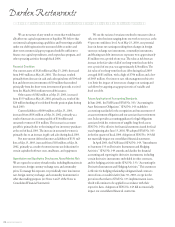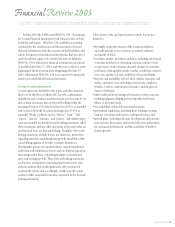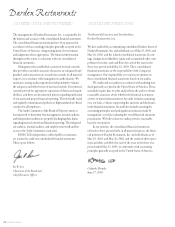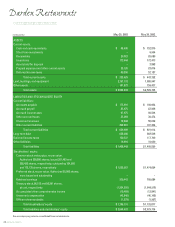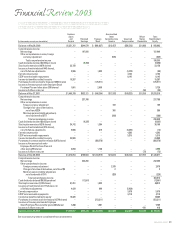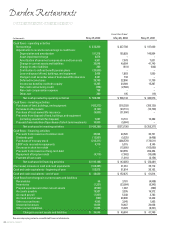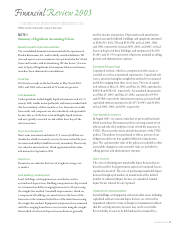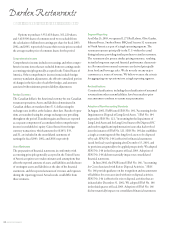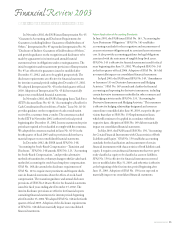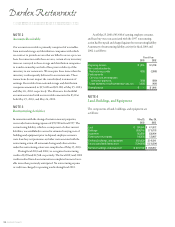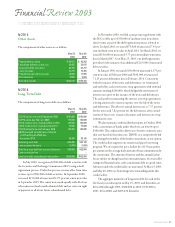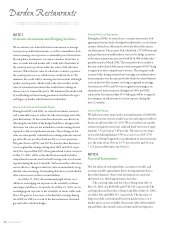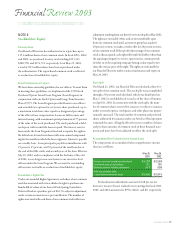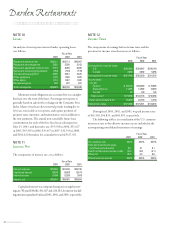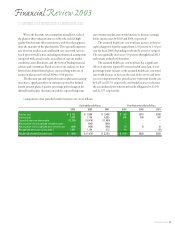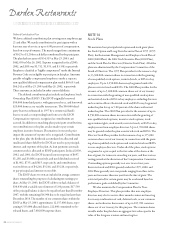Red Lobster 2003 Annual Report Download - page 36
Download and view the complete annual report
Please find page 36 of the 2003 Red Lobster annual report below. You can navigate through the pages in the report by either clicking on the pages listed below, or by using the keyword search tool below to find specific information within the annual report.
34 DARDEN RESTAURANTS
Options to purchase 3,952,618 shares, 161,220 shares,
and 3,618,900 shares of common stock were excluded from
the calculation of diluted net earnings per share for fiscal 2003,
2002, and 2001, respectively, because their exercise prices exceeded
the average market price of common shares for the period.
Comprehensive Income
Comprehensive income includes net earnings and other compre-
hensive income items that are excluded from net earnings under
accounting principles generally accepted in the United States of
America. Other comprehensive income items include foreign
currency translation adjustments, the effective unrealized portion
of changes in the fair value of cash flow hedges, and amounts
associated with minimum pension liability adjustments.
Foreign Currency
The Canadian dollar is the functional currency for our Canadian
restaurant operations. Assets and liabilities denominated in
Canadian dollars are translated into U.S. dollars using the
exchange rates in effect at the balance sheet date. Results of opera-
tions are translated using the average exchange rates prevailing
throughout the period. Translation gains and losses are reported
as a separate component of accumulated other comprehensive
income in stockholders’ equity. Gains (losses) from foreign
currency transactions, which amounted to ($105), $33,
and $1, are included in the consolidated statements of
earnings for fiscal 2003, 2002, and 2001 respectively.
Use of Estimates
The preparation of financial statements in conformity with
accounting principles generally accepted in the United States
of America requires us to make estimates and assumptions that
affect the reported amounts of assets and liabilities and disclosure
of contingent assets and liabilities at the date of the financial
statements, and the reported amounts of revenues and expenses
during the reporting period. Actual results could differ from
those estimates.
Segment Reporting
As of May 25, 2003, we operated 1,271 Red Lobster, Olive Garden,
Bahama Breeze, Smokey Bones BBQ and Seasons 52 restaurants
in North America as part of a single operating segment. The
restaurants operate principally in the U.S. within the casual
dining industry, providing similar products to similar customers.
The restaurants also possess similar pricing structures, resulting
in similar long-term expected financial performance characteris-
tics. Revenues from external customers are derived principally
from food and beverage sales. We do not rely on any major
customers as a source of revenue. We believe we meet the criteria
for aggregating our operations into a single reporting segment.
Reclassifications
Certain reclassifications, including the reclassification of unearned
revenues from other current liabilities, have been made to prior
year amounts to conform to current year presentation.
Adoption of New Accounting Standards
In August 2001, FASB issued SFAS No. 144, “Accounting for the
Impairment or Disposal of Long-Lived Assets.” SFAS No. 144
supersedes SFAS No. 121, “Accounting for the Impairment of
Long-Lived Assets and for Long-Lived Assets to Be Disposed Of,”
and resolves significant implementation issues that had evolved
since the issuance of SFAS No. 121. SFAS No. 144 also establishes
a single accounting model for long-lived assets to be disposed
of by sale. SFAS No. 144 is effective for financial statements
issued for fiscal years beginning after December 15, 2001, and
its provisions are generally to be applied prospectively. We adopted
SFAS No. 144 in the first quarter of fiscal 2003. Adoption of
SFAS No. 144 did not materially impact our consolidated
financial statements.
In June 2002, the FASB issued SFAS No. 146, “Accounting
for Costs Associated with Exit or Disposal Activities.” SFAS
No. 146 provides guidance on the recognition and measurement
of liabilities for costs associated with exit or disposal activities.
SFAS No. 146 is effective for exit or disposal activities that are
initiated after December 31, 2002. We adopted SFAS No. 146
in the third quarter of fiscal 2003. Adoption of SFAS No. 146
did not materially impact our consolidated financial statements.
Darden Restaurants
Notes to Consolidated Financial Statements


